A Detailed Examination of Mao Zedong's Role in the New Regime
VerifiedAdded on 2022/11/19
|6
|1740
|120
Essay
AI Summary
This essay examines the pivotal role of Mao Zedong in the Chinese Revolution and his lasting impact on the nation. It delves into his contributions to the Chinese Communist Party (CCP) and the subsequent establishment of the People's Republic of China. The essay discusses Mao's Marxist-Leninist ideology, military strategies, and political policies, collectively known as Maoism, which shaped the course of Chinese history. It analyzes the key events, including the end of the civil war, the Land Reform Campaign, and the Cultural Revolution, highlighting how Mao's leadership consolidated the CCP's power and transformed Chinese society. The essay also explores the social and political changes that occurred during this period, focusing on the separation of intellectual and manual labor and the rise of the working class. The essay also discusses Mao's early protests, his efforts to unite the working class, and his impact on the revolution's widespread support. The conclusion emphasizes Mao Zedong's significant influence in reforming Chinese society and establishing the PRC, which uplifted the status of the Chinese people.
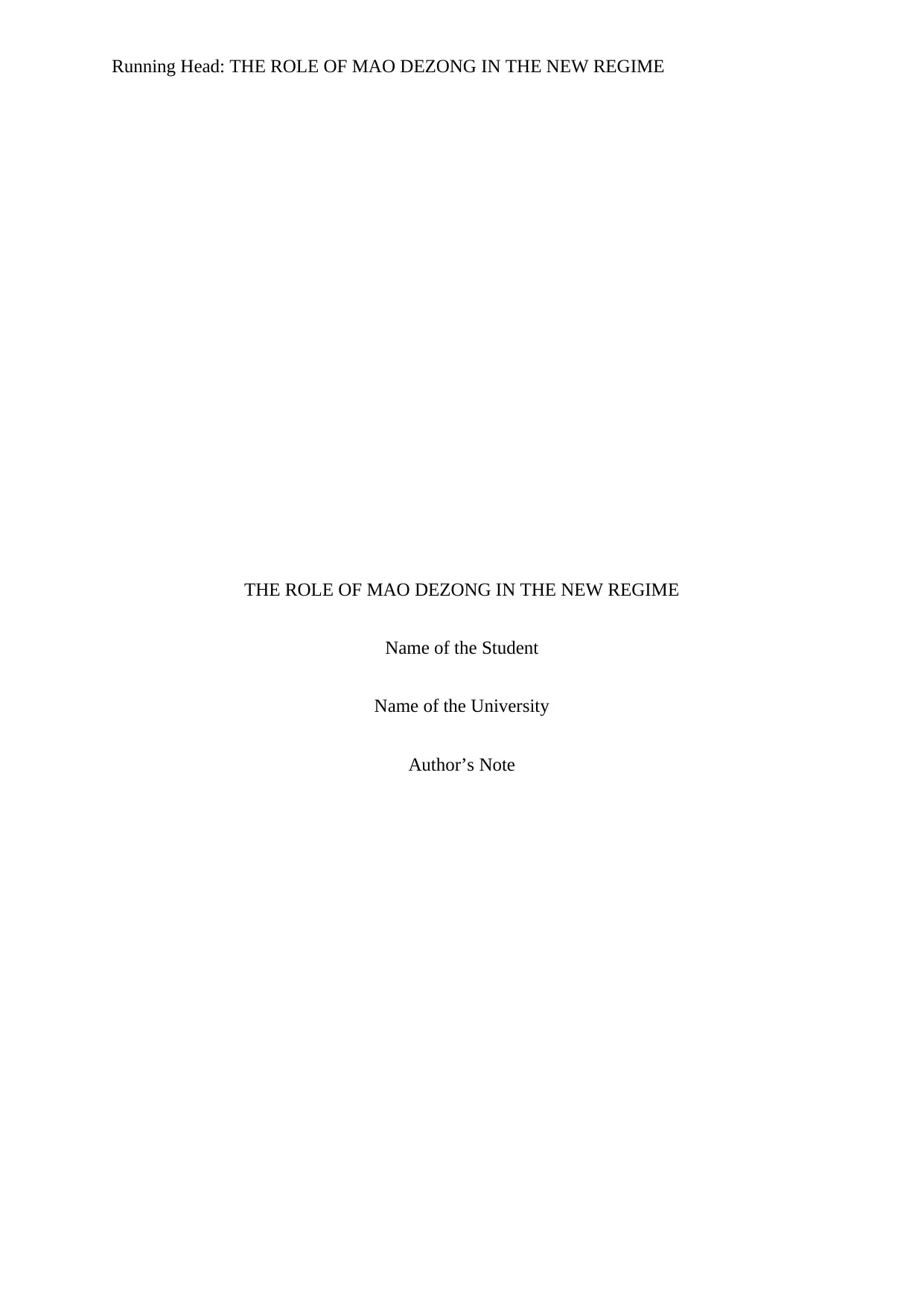
Running Head: THE ROLE OF MAO DEZONG IN THE NEW REGIME
THE ROLE OF MAO DEZONG IN THE NEW REGIME
Name of the Student
Name of the University
Author’s Note
THE ROLE OF MAO DEZONG IN THE NEW REGIME
Name of the Student
Name of the University
Author’s Note
Paraphrase This Document
Need a fresh take? Get an instant paraphrase of this document with our AI Paraphraser
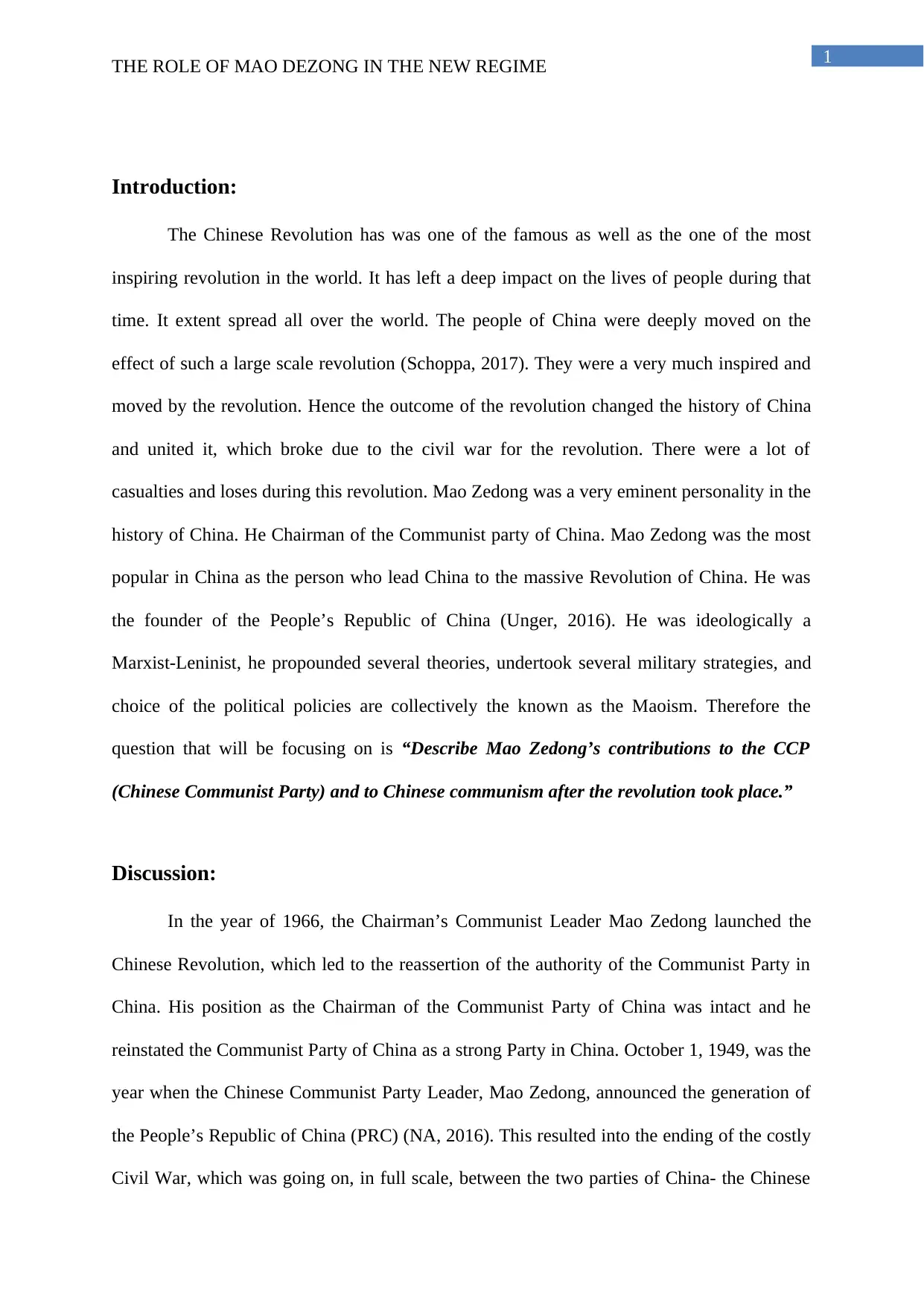
1
THE ROLE OF MAO DEZONG IN THE NEW REGIME
Introduction:
The Chinese Revolution has was one of the famous as well as the one of the most
inspiring revolution in the world. It has left a deep impact on the lives of people during that
time. It extent spread all over the world. The people of China were deeply moved on the
effect of such a large scale revolution (Schoppa, 2017). They were a very much inspired and
moved by the revolution. Hence the outcome of the revolution changed the history of China
and united it, which broke due to the civil war for the revolution. There were a lot of
casualties and loses during this revolution. Mao Zedong was a very eminent personality in the
history of China. He Chairman of the Communist party of China. Mao Zedong was the most
popular in China as the person who lead China to the massive Revolution of China. He was
the founder of the People’s Republic of China (Unger, 2016). He was ideologically a
Marxist-Leninist, he propounded several theories, undertook several military strategies, and
choice of the political policies are collectively the known as the Maoism. Therefore the
question that will be focusing on is “Describe Mao Zedong’s contributions to the CCP
(Chinese Communist Party) and to Chinese communism after the revolution took place.”
Discussion:
In the year of 1966, the Chairman’s Communist Leader Mao Zedong launched the
Chinese Revolution, which led to the reassertion of the authority of the Communist Party in
China. His position as the Chairman of the Communist Party of China was intact and he
reinstated the Communist Party of China as a strong Party in China. October 1, 1949, was the
year when the Chinese Communist Party Leader, Mao Zedong, announced the generation of
the People’s Republic of China (PRC) (NA, 2016). This resulted into the ending of the costly
Civil War, which was going on, in full scale, between the two parties of China- the Chinese
THE ROLE OF MAO DEZONG IN THE NEW REGIME
Introduction:
The Chinese Revolution has was one of the famous as well as the one of the most
inspiring revolution in the world. It has left a deep impact on the lives of people during that
time. It extent spread all over the world. The people of China were deeply moved on the
effect of such a large scale revolution (Schoppa, 2017). They were a very much inspired and
moved by the revolution. Hence the outcome of the revolution changed the history of China
and united it, which broke due to the civil war for the revolution. There were a lot of
casualties and loses during this revolution. Mao Zedong was a very eminent personality in the
history of China. He Chairman of the Communist party of China. Mao Zedong was the most
popular in China as the person who lead China to the massive Revolution of China. He was
the founder of the People’s Republic of China (Unger, 2016). He was ideologically a
Marxist-Leninist, he propounded several theories, undertook several military strategies, and
choice of the political policies are collectively the known as the Maoism. Therefore the
question that will be focusing on is “Describe Mao Zedong’s contributions to the CCP
(Chinese Communist Party) and to Chinese communism after the revolution took place.”
Discussion:
In the year of 1966, the Chairman’s Communist Leader Mao Zedong launched the
Chinese Revolution, which led to the reassertion of the authority of the Communist Party in
China. His position as the Chairman of the Communist Party of China was intact and he
reinstated the Communist Party of China as a strong Party in China. October 1, 1949, was the
year when the Chinese Communist Party Leader, Mao Zedong, announced the generation of
the People’s Republic of China (PRC) (NA, 2016). This resulted into the ending of the costly
Civil War, which was going on, in full scale, between the two parties of China- the Chinese
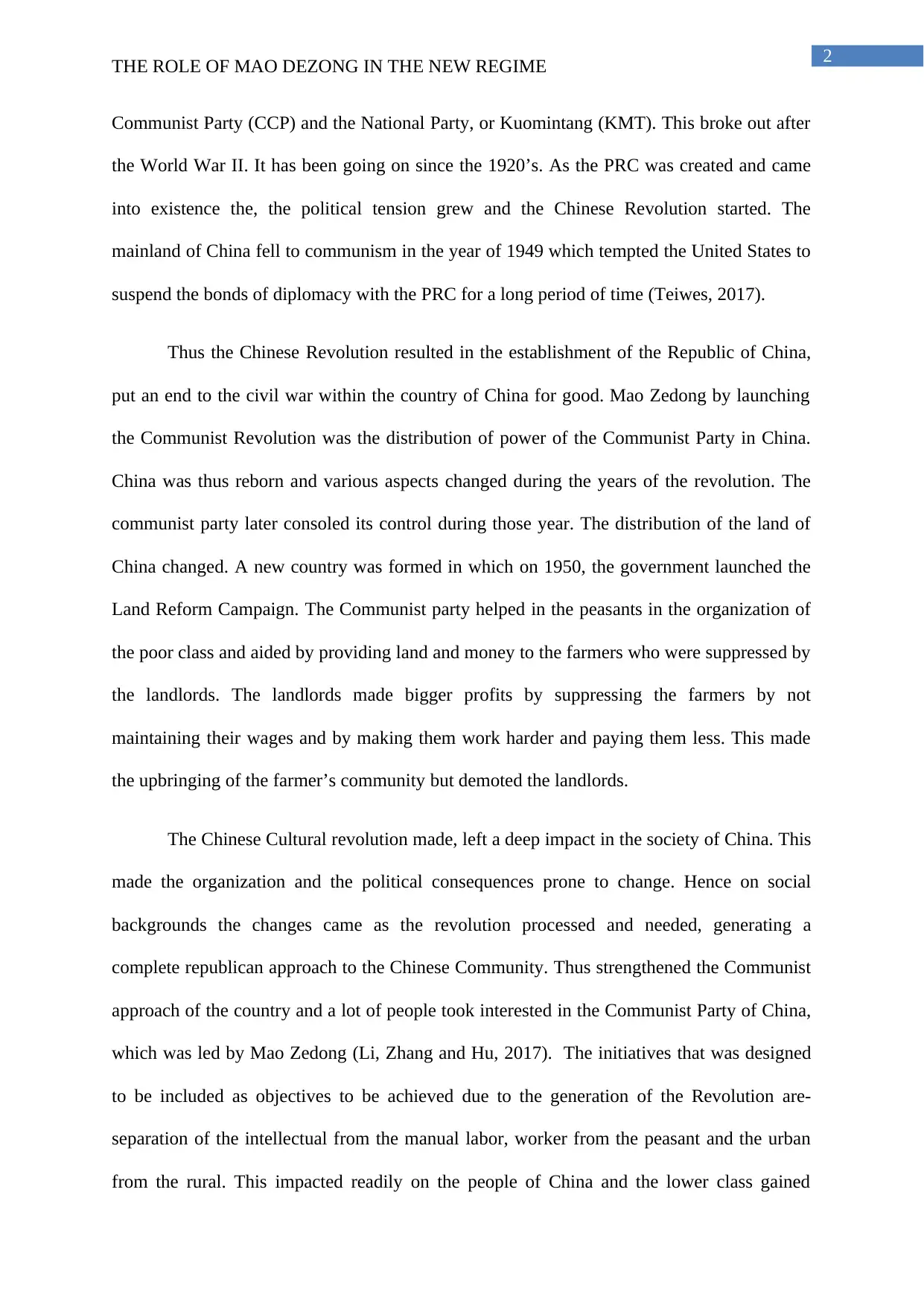
2
THE ROLE OF MAO DEZONG IN THE NEW REGIME
Communist Party (CCP) and the National Party, or Kuomintang (KMT). This broke out after
the World War II. It has been going on since the 1920’s. As the PRC was created and came
into existence the, the political tension grew and the Chinese Revolution started. The
mainland of China fell to communism in the year of 1949 which tempted the United States to
suspend the bonds of diplomacy with the PRC for a long period of time (Teiwes, 2017).
Thus the Chinese Revolution resulted in the establishment of the Republic of China,
put an end to the civil war within the country of China for good. Mao Zedong by launching
the Communist Revolution was the distribution of power of the Communist Party in China.
China was thus reborn and various aspects changed during the years of the revolution. The
communist party later consoled its control during those year. The distribution of the land of
China changed. A new country was formed in which on 1950, the government launched the
Land Reform Campaign. The Communist party helped in the peasants in the organization of
the poor class and aided by providing land and money to the farmers who were suppressed by
the landlords. The landlords made bigger profits by suppressing the farmers by not
maintaining their wages and by making them work harder and paying them less. This made
the upbringing of the farmer’s community but demoted the landlords.
The Chinese Cultural revolution made, left a deep impact in the society of China. This
made the organization and the political consequences prone to change. Hence on social
backgrounds the changes came as the revolution processed and needed, generating a
complete republican approach to the Chinese Community. Thus strengthened the Communist
approach of the country and a lot of people took interested in the Communist Party of China,
which was led by Mao Zedong (Li, Zhang and Hu, 2017). The initiatives that was designed
to be included as objectives to be achieved due to the generation of the Revolution are-
separation of the intellectual from the manual labor, worker from the peasant and the urban
from the rural. This impacted readily on the people of China and the lower class gained
THE ROLE OF MAO DEZONG IN THE NEW REGIME
Communist Party (CCP) and the National Party, or Kuomintang (KMT). This broke out after
the World War II. It has been going on since the 1920’s. As the PRC was created and came
into existence the, the political tension grew and the Chinese Revolution started. The
mainland of China fell to communism in the year of 1949 which tempted the United States to
suspend the bonds of diplomacy with the PRC for a long period of time (Teiwes, 2017).
Thus the Chinese Revolution resulted in the establishment of the Republic of China,
put an end to the civil war within the country of China for good. Mao Zedong by launching
the Communist Revolution was the distribution of power of the Communist Party in China.
China was thus reborn and various aspects changed during the years of the revolution. The
communist party later consoled its control during those year. The distribution of the land of
China changed. A new country was formed in which on 1950, the government launched the
Land Reform Campaign. The Communist party helped in the peasants in the organization of
the poor class and aided by providing land and money to the farmers who were suppressed by
the landlords. The landlords made bigger profits by suppressing the farmers by not
maintaining their wages and by making them work harder and paying them less. This made
the upbringing of the farmer’s community but demoted the landlords.
The Chinese Cultural revolution made, left a deep impact in the society of China. This
made the organization and the political consequences prone to change. Hence on social
backgrounds the changes came as the revolution processed and needed, generating a
complete republican approach to the Chinese Community. Thus strengthened the Communist
approach of the country and a lot of people took interested in the Communist Party of China,
which was led by Mao Zedong (Li, Zhang and Hu, 2017). The initiatives that was designed
to be included as objectives to be achieved due to the generation of the Revolution are-
separation of the intellectual from the manual labor, worker from the peasant and the urban
from the rural. This impacted readily on the people of China and the lower class gained
⊘ This is a preview!⊘
Do you want full access?
Subscribe today to unlock all pages.

Trusted by 1+ million students worldwide
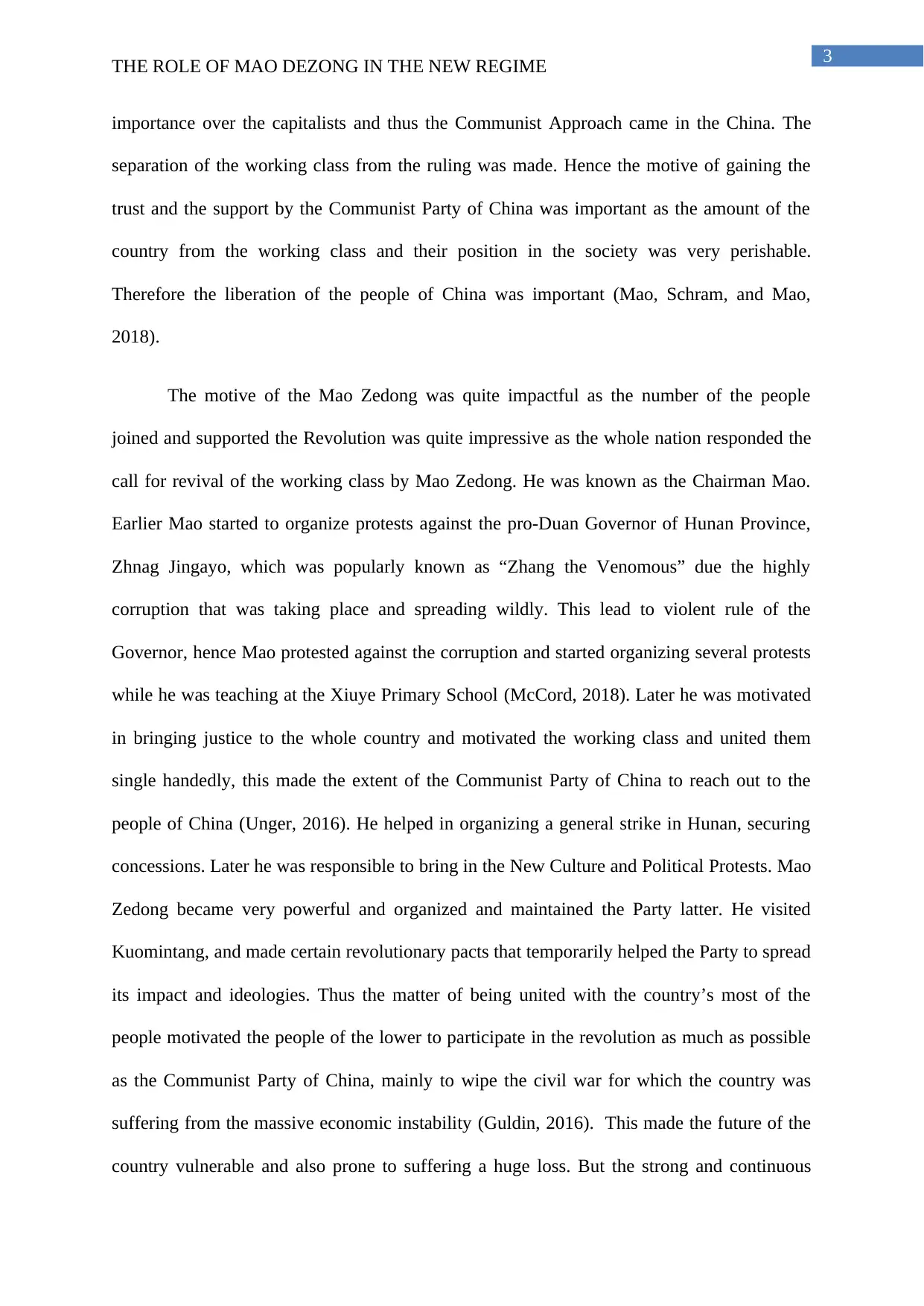
3
THE ROLE OF MAO DEZONG IN THE NEW REGIME
importance over the capitalists and thus the Communist Approach came in the China. The
separation of the working class from the ruling was made. Hence the motive of gaining the
trust and the support by the Communist Party of China was important as the amount of the
country from the working class and their position in the society was very perishable.
Therefore the liberation of the people of China was important (Mao, Schram, and Mao,
2018).
The motive of the Mao Zedong was quite impactful as the number of the people
joined and supported the Revolution was quite impressive as the whole nation responded the
call for revival of the working class by Mao Zedong. He was known as the Chairman Mao.
Earlier Mao started to organize protests against the pro-Duan Governor of Hunan Province,
Zhnag Jingayo, which was popularly known as “Zhang the Venomous” due the highly
corruption that was taking place and spreading wildly. This lead to violent rule of the
Governor, hence Mao protested against the corruption and started organizing several protests
while he was teaching at the Xiuye Primary School (McCord, 2018). Later he was motivated
in bringing justice to the whole country and motivated the working class and united them
single handedly, this made the extent of the Communist Party of China to reach out to the
people of China (Unger, 2016). He helped in organizing a general strike in Hunan, securing
concessions. Later he was responsible to bring in the New Culture and Political Protests. Mao
Zedong became very powerful and organized and maintained the Party latter. He visited
Kuomintang, and made certain revolutionary pacts that temporarily helped the Party to spread
its impact and ideologies. Thus the matter of being united with the country’s most of the
people motivated the people of the lower to participate in the revolution as much as possible
as the Communist Party of China, mainly to wipe the civil war for which the country was
suffering from the massive economic instability (Guldin, 2016). This made the future of the
country vulnerable and also prone to suffering a huge loss. But the strong and continuous
THE ROLE OF MAO DEZONG IN THE NEW REGIME
importance over the capitalists and thus the Communist Approach came in the China. The
separation of the working class from the ruling was made. Hence the motive of gaining the
trust and the support by the Communist Party of China was important as the amount of the
country from the working class and their position in the society was very perishable.
Therefore the liberation of the people of China was important (Mao, Schram, and Mao,
2018).
The motive of the Mao Zedong was quite impactful as the number of the people
joined and supported the Revolution was quite impressive as the whole nation responded the
call for revival of the working class by Mao Zedong. He was known as the Chairman Mao.
Earlier Mao started to organize protests against the pro-Duan Governor of Hunan Province,
Zhnag Jingayo, which was popularly known as “Zhang the Venomous” due the highly
corruption that was taking place and spreading wildly. This lead to violent rule of the
Governor, hence Mao protested against the corruption and started organizing several protests
while he was teaching at the Xiuye Primary School (McCord, 2018). Later he was motivated
in bringing justice to the whole country and motivated the working class and united them
single handedly, this made the extent of the Communist Party of China to reach out to the
people of China (Unger, 2016). He helped in organizing a general strike in Hunan, securing
concessions. Later he was responsible to bring in the New Culture and Political Protests. Mao
Zedong became very powerful and organized and maintained the Party latter. He visited
Kuomintang, and made certain revolutionary pacts that temporarily helped the Party to spread
its impact and ideologies. Thus the matter of being united with the country’s most of the
people motivated the people of the lower to participate in the revolution as much as possible
as the Communist Party of China, mainly to wipe the civil war for which the country was
suffering from the massive economic instability (Guldin, 2016). This made the future of the
country vulnerable and also prone to suffering a huge loss. But the strong and continuous
Paraphrase This Document
Need a fresh take? Get an instant paraphrase of this document with our AI Paraphraser
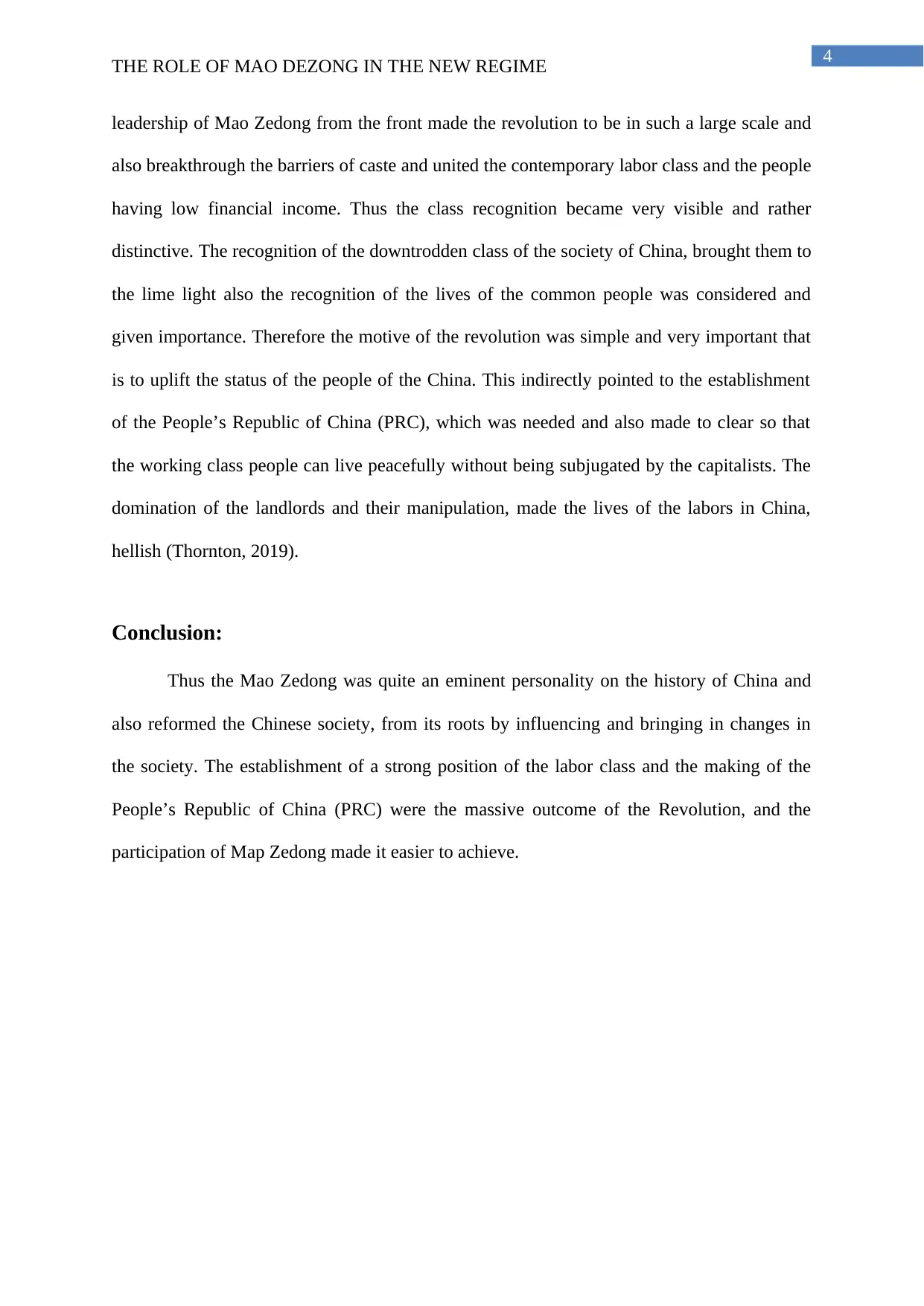
4
THE ROLE OF MAO DEZONG IN THE NEW REGIME
leadership of Mao Zedong from the front made the revolution to be in such a large scale and
also breakthrough the barriers of caste and united the contemporary labor class and the people
having low financial income. Thus the class recognition became very visible and rather
distinctive. The recognition of the downtrodden class of the society of China, brought them to
the lime light also the recognition of the lives of the common people was considered and
given importance. Therefore the motive of the revolution was simple and very important that
is to uplift the status of the people of the China. This indirectly pointed to the establishment
of the People’s Republic of China (PRC), which was needed and also made to clear so that
the working class people can live peacefully without being subjugated by the capitalists. The
domination of the landlords and their manipulation, made the lives of the labors in China,
hellish (Thornton, 2019).
Conclusion:
Thus the Mao Zedong was quite an eminent personality on the history of China and
also reformed the Chinese society, from its roots by influencing and bringing in changes in
the society. The establishment of a strong position of the labor class and the making of the
People’s Republic of China (PRC) were the massive outcome of the Revolution, and the
participation of Map Zedong made it easier to achieve.
THE ROLE OF MAO DEZONG IN THE NEW REGIME
leadership of Mao Zedong from the front made the revolution to be in such a large scale and
also breakthrough the barriers of caste and united the contemporary labor class and the people
having low financial income. Thus the class recognition became very visible and rather
distinctive. The recognition of the downtrodden class of the society of China, brought them to
the lime light also the recognition of the lives of the common people was considered and
given importance. Therefore the motive of the revolution was simple and very important that
is to uplift the status of the people of the China. This indirectly pointed to the establishment
of the People’s Republic of China (PRC), which was needed and also made to clear so that
the working class people can live peacefully without being subjugated by the capitalists. The
domination of the landlords and their manipulation, made the lives of the labors in China,
hellish (Thornton, 2019).
Conclusion:
Thus the Mao Zedong was quite an eminent personality on the history of China and
also reformed the Chinese society, from its roots by influencing and bringing in changes in
the society. The establishment of a strong position of the labor class and the making of the
People’s Republic of China (PRC) were the massive outcome of the Revolution, and the
participation of Map Zedong made it easier to achieve.
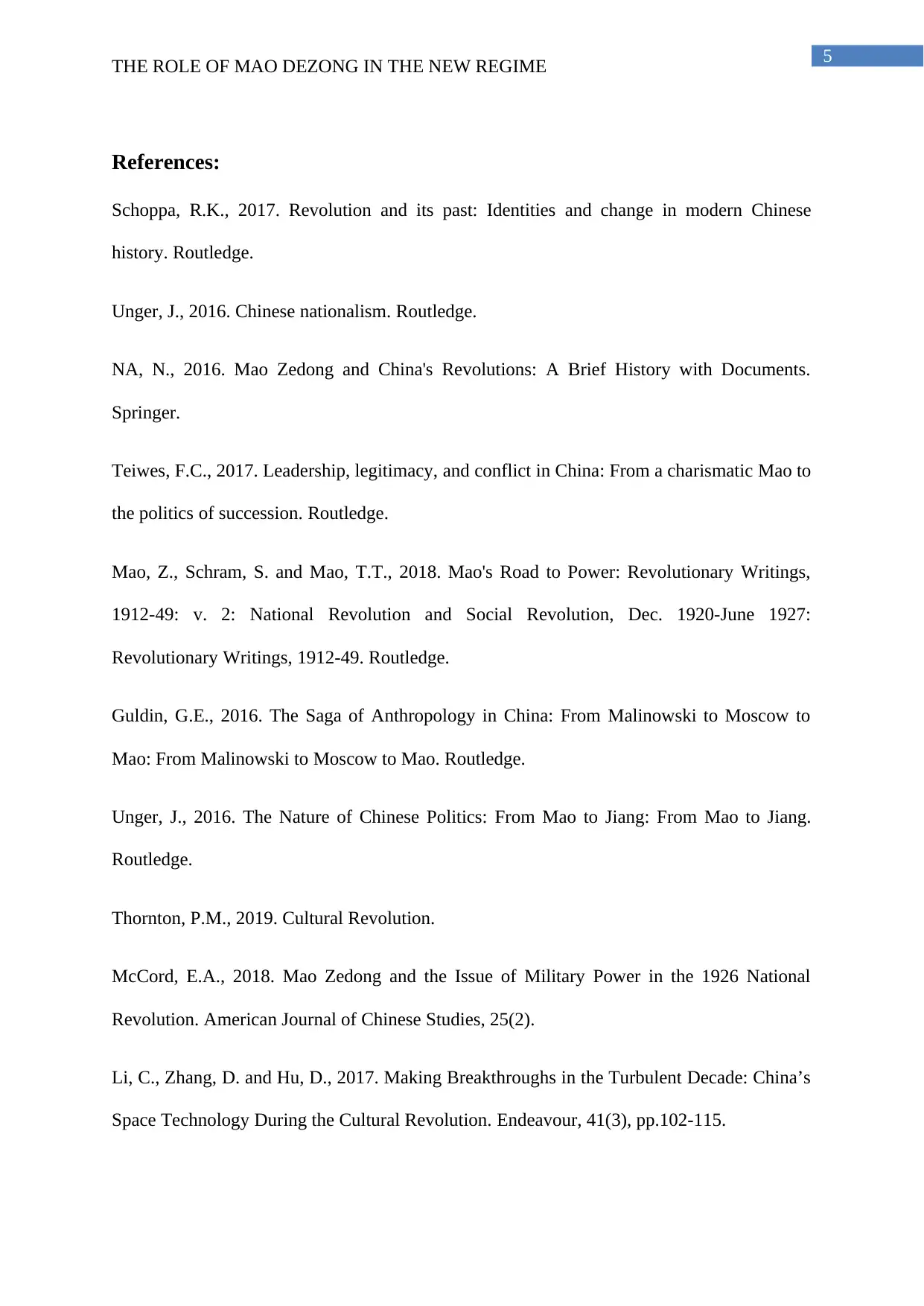
5
THE ROLE OF MAO DEZONG IN THE NEW REGIME
References:
Schoppa, R.K., 2017. Revolution and its past: Identities and change in modern Chinese
history. Routledge.
Unger, J., 2016. Chinese nationalism. Routledge.
NA, N., 2016. Mao Zedong and China's Revolutions: A Brief History with Documents.
Springer.
Teiwes, F.C., 2017. Leadership, legitimacy, and conflict in China: From a charismatic Mao to
the politics of succession. Routledge.
Mao, Z., Schram, S. and Mao, T.T., 2018. Mao's Road to Power: Revolutionary Writings,
1912-49: v. 2: National Revolution and Social Revolution, Dec. 1920-June 1927:
Revolutionary Writings, 1912-49. Routledge.
Guldin, G.E., 2016. The Saga of Anthropology in China: From Malinowski to Moscow to
Mao: From Malinowski to Moscow to Mao. Routledge.
Unger, J., 2016. The Nature of Chinese Politics: From Mao to Jiang: From Mao to Jiang.
Routledge.
Thornton, P.M., 2019. Cultural Revolution.
McCord, E.A., 2018. Mao Zedong and the Issue of Military Power in the 1926 National
Revolution. American Journal of Chinese Studies, 25(2).
Li, C., Zhang, D. and Hu, D., 2017. Making Breakthroughs in the Turbulent Decade: China’s
Space Technology During the Cultural Revolution. Endeavour, 41(3), pp.102-115.
THE ROLE OF MAO DEZONG IN THE NEW REGIME
References:
Schoppa, R.K., 2017. Revolution and its past: Identities and change in modern Chinese
history. Routledge.
Unger, J., 2016. Chinese nationalism. Routledge.
NA, N., 2016. Mao Zedong and China's Revolutions: A Brief History with Documents.
Springer.
Teiwes, F.C., 2017. Leadership, legitimacy, and conflict in China: From a charismatic Mao to
the politics of succession. Routledge.
Mao, Z., Schram, S. and Mao, T.T., 2018. Mao's Road to Power: Revolutionary Writings,
1912-49: v. 2: National Revolution and Social Revolution, Dec. 1920-June 1927:
Revolutionary Writings, 1912-49. Routledge.
Guldin, G.E., 2016. The Saga of Anthropology in China: From Malinowski to Moscow to
Mao: From Malinowski to Moscow to Mao. Routledge.
Unger, J., 2016. The Nature of Chinese Politics: From Mao to Jiang: From Mao to Jiang.
Routledge.
Thornton, P.M., 2019. Cultural Revolution.
McCord, E.A., 2018. Mao Zedong and the Issue of Military Power in the 1926 National
Revolution. American Journal of Chinese Studies, 25(2).
Li, C., Zhang, D. and Hu, D., 2017. Making Breakthroughs in the Turbulent Decade: China’s
Space Technology During the Cultural Revolution. Endeavour, 41(3), pp.102-115.
⊘ This is a preview!⊘
Do you want full access?
Subscribe today to unlock all pages.

Trusted by 1+ million students worldwide
1 out of 6
Related Documents
Your All-in-One AI-Powered Toolkit for Academic Success.
+13062052269
info@desklib.com
Available 24*7 on WhatsApp / Email
![[object Object]](/_next/static/media/star-bottom.7253800d.svg)
Unlock your academic potential
Copyright © 2020–2026 A2Z Services. All Rights Reserved. Developed and managed by ZUCOL.





